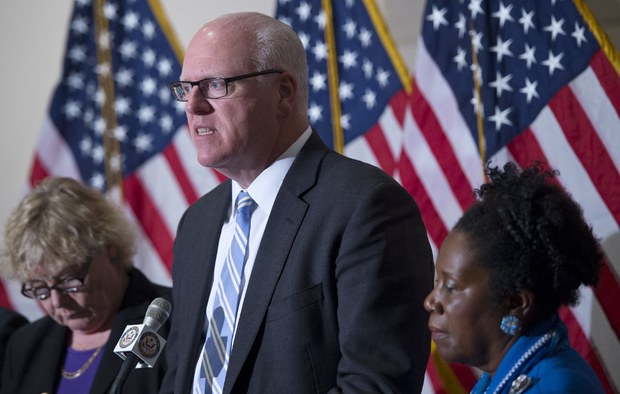Bangladesh: 27 Deportees Return from United States
2016.04.06
Washington, D.C.
 U.S. congressman Joseph Crowley (D-New York) did not succeed in his attempt to slow the deportation of 27 Bangladeshis. He is pictured speaking after a meeting of the House Democratic Caucus in Washington, July 9, 2014.
U.S. congressman Joseph Crowley (D-New York) did not succeed in his attempt to slow the deportation of 27 Bangladeshis. He is pictured speaking after a meeting of the House Democratic Caucus in Washington, July 9, 2014.
A group of 27 asylum seekers from Bangladesh who had been detained in the United States returned to Dhaka on Wednesday, despite calls from U.S. lawmakers to delay their deportations.
Bangladesh’s home minister and the officer-in-charge of Hajrat Shahjalal International Airport confirmed the arrivals of the 27 deportees to BenarNews.
Earlier this week, Home Minister Asaduzzaman Khan Kamal said that the two countries had worked together to set up the transfer of U.S. asylum seekers from Bangladesh.
“They [the U.S. government] sent us the list of the Bangladeshis facing deportation,” Home Minister Asaduzzaman Khan Kamal told BenarNews on Monday.
He said claims by the asylum seekers that they had left their country to escape from government repression were not correct.
“The people seeking political asylum very often make such false claims; they are doing that to get political asylum,” he said.
The repatriation to Bangladesh occurred just days after at least four U.S. congress members asked the U.S. State Department and Department of Homeland Security to delay by two months the return of nearly 100 Bangladeshi men who were seeking asylum in the United States.
Joseph Crowley, a Democratic congressman from New York City, sent a letter to the two departments on March 28 asking them to stop the deportations until thorough assessments of asylum claims were completed.
Apart from the 27 Bangladeshis who returned home on Wednesday, the status of the other asylum seekers remained unknown.
He said members of the Bangladeshi-American community raised a series of questions, including: would those scheduled for deportation or their families face danger; were they part of a common group based on political affiliation, religion or other characteristics; and had any Bangladesh nationals who were recently deported faced persecution upon their return?
“I have long believed that no one should be sent into a situation where they face danger or persecution,” Crowley wrote.
Others in congress who expressed concern for the Bangladeshis are representatives Mike Honda and Judy Chu, Democrats who represent districts in California.
“Given concerns surrounding their asylum proceedings, we strongly request that the deportations of these individuals be delayed by two months to allow for their cases to be reevaluated and allow their lawyers time to file motions to reopen and emergency stays of removal,” Honda and Chu said in their letter to Homeland Security.
Honda and Chu stated that the asylum seekers were members of the opposition Bangladesh Nationalist Party (BNP) who claimed they were being persecuted by the Bangladeshi government, which is led by the Awami League party. Honda and Chu said the detainees had not had “full access to due process and that information about them has been provided to the media in Bangladesh, resulting in threats to their families.”
On Monday, Bangladesh State Minister for Foreign Affairs Shahriar Alam told BenarNews that the detainees were not telling the truth in their asylum application in order to stay in the U.S.
“I tell you officially that the asylum seekers always lie to stay in a developed country,” Alam said. “Their applications were turned down and we have nothing to do with the case.”
Hunger strike
In December, a group of Bangladeshi men voluntarily ended a 19-day hunger strike at a federal detention center in Florida after being denied asylum in the U.S.
The inmates at the Krome Service Processing Center in Miami ended their strike the same day that a federal judge apparently authorized their force-feeding, if necessary.
It brought to a close the last of a series of hunger strikes carried out in the last quarter of 2015 by about 100 people from Bangladesh and other countries at U.S. Immigration and Customs Enforcement detentions centers in six states.
Kamran Reza Chowdhury in Dhaka contributed to this report.







